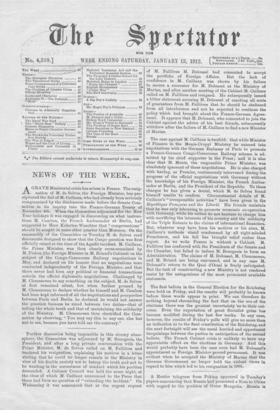The case against M. Caillaux is twofold : that while
Minister of Finance in the Monis-Cruppi Ministry he entered into negotiations with the German Embassy at Paris to promote a Franco-German Congo-Cameroons Railway scheme is ad- mitted by his chief supporter in the Press ; and it is also clear that M. Monis, the responsible Prime Minister, was absolutely ignorant of these negotiations. He is also charged with having, as Premier, continuously intervened during the progress of the official negotiations with Germany without the knowledge of his Foreign Minister, the French Ambas- sador at Berlin, and the President of the Republic. To these charges he has given a denial, which M. do Selves found himself unable to confirm. Circumstantial details of M. Caillaux's "irresponsible activities" have been given in the B6publigue Franfaise and the Liberte. His friends maintain that he was only labouring to promote economic co-operation with Germany, while his critics do not hesitate to charge him with sacrificing the interests of his country and the solidarity of the Triple Entente to the claims of international financiers. But, whatever may have been his motives or his aims, IL Caillaux's methods stand condemned by all right-minded Frenchmen, and his fall has brought relief rather than regret. As wo write France is without a Cabinet. M. Fallieres has conferred with the Presidents of the Senate and the Chamber, but failed to induce M. Bourgeois to form an Administration. The claims of M. Delcass6, M. Clemenceau, and M. Briand are being canvassed, and in any case M. Deleasses return to the Quai d'Orsai is freely anticipated. But the task of constructing a new Ministry is not rendered easier by the antagonisms of the most prominent available statesmen.










































